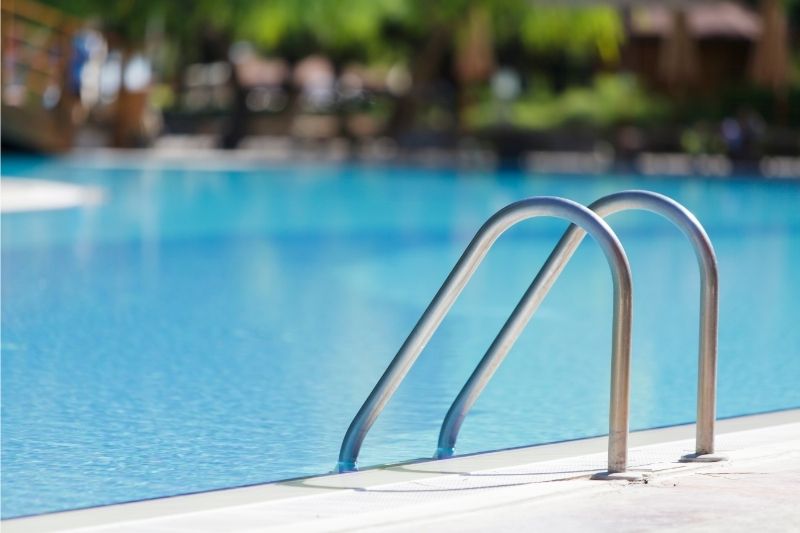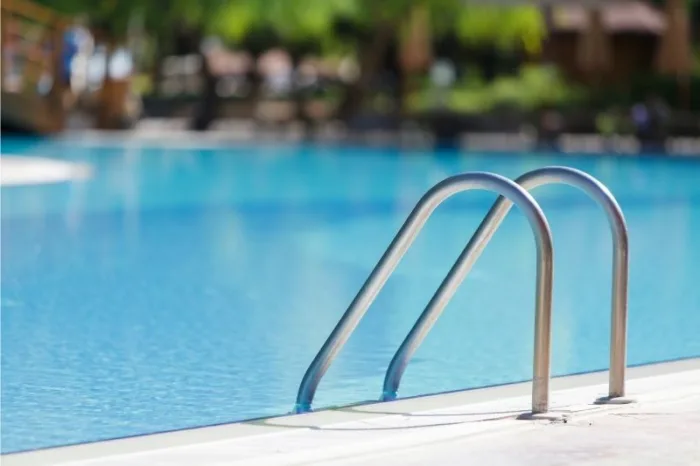Key takeaways
- Renting a property with a pool has its share of advantages and disadvantages.
- Your biggest concern when considering providing a pool as an amenity should be maintenance and residents’ safety.
- Maintaining a pool entails diligent weekly measures, which are fairly easy to do. However, repairing or replacing a pool can be costly and difficult.
- You should provide a strict list of pool rules and enclose the area with a secure access control system.
- Have your residents sign a pool waiver, regardless of their intention of using the pool. Additionally, enroll in pool liability insurance to protect both the property and your residents when incidents occur.

Renting a property with a pool is one of the most enticing apartment amenities you can provide. However, it can also be the most challenging in terms of safety and maintenance.
In this guide, we’ll go over the pros and cons of renting a property with a pool, detailing what you can expect in terms of maintenance. Then, we’ll dive into some safety and liability tips for providing residents with the best pool experience possible.
This guide will cover:
- Is a rental with a pool a good idea?
- Are landlords responsible for pool maintenance?
- 4 safety and liability tips for renting a property with a pool
Discover the 8 best apartment amenities:
Is a rental with a pool a good idea?
Putting a pool on a rental property increases demand for your property exponentially and raises its value. However, renting a property with a pool is not easy — there’s no way to sugarcoat that.
Swimming is the fourth most popular recreational activity in the United States for adults and the most popular activity for children. So, adding a pool to your multifamily property will attract residents of all ages. However, it’s important to keep in mind the struggles you’ll face, as well as the benefits of adding a pool to your property.
Below are the advantages and disadvantages of renting with a pool:
Are landlords responsible for pool maintenance?
With a resounding yes, you will be responsible for pool maintenance. However, this doesn’t mean it’ll be any more difficult than maintaining anything else on your property.
You’ll need to perform these routine pool maintenance tasks:
- Both indoor and outdoor pools require weekly skimming and vacuuming.
- Pool filters must be frequently checked and cleaned.
- Pools need to have their pH levels checked to determine the acidity of the water. Also, you’ll need to apply chlorine frequently to eliminate bacteria and odors.
- Depending on how big your property is, you might need to hire additional staff to maintain the pool. However, this wouldn’t be a full-time position — existing custodial staff could fulfill these responsibilities.
The time and effort put into maintaining a swimming pool at a rental property will vary depending on the age and size of your pool.
For instance, an above-ground pool on your rental property is much more affordable to install and easier to maintain than a below-ground one. On the other hand, indoor pools are even easier to maintain because you don’t have to worry about weather conditions or dust obstructing the pool. However, indoor pools take up space inside your property that could’ve been used for other amenities, such as lounges and gyms.
Should residents pay for pool service?
Yes, but you may not want to charge a separate amenity fee to use the pool. Upfront fees for using the pool could feel awkward and impractical, shying residents away from using it.
Instead, you should consider increasing the overall rent. If your property has a pool, you can justify setting a slightly higher rental price than similar buildings in the area without a pool.

4 safety and liability tips for renting a property with a pool
Once you’ve determined that offering a pool as an outdoor amenity is a worthwhile investment, you need to implement safety rules for residents to follow when using the pool. Not only will these rules keep residents safe, but they’ll also protect you and your property against liability issues.
The four most important safety and liability tips for renting a property with a pool are:
- Have residents sign a pool waiver
- Install an access control system
- Create an accessible list of pool rules
- Consider purchasing liability insurance
1. Have residents sign a pool waiver
A pool waiver for your rental property is a document that explains the risks associated with using the pool and outlines safety and conduct rules for residents and their children. You should require all residents to sign this waiver, regardless of their intent to use the pool. For simplicity, include the pool waiver in residents’ lease agreements.
That said, a pool waiver won’t remove you from all legal liabilities in the event of an accident. You still must ensure that as many safety measures are in place as possible. Typically, you will have to follow pool safety legislation specific to your local area, which you can use to set pool guidelines at your property.
2. Install an access control system
All pools need an access control system to deter unwanted visitors from trespassing. An access control system also ensures that residents won’t enter the pool area when it’s closed or unattended.
Additionally, outdoor pools should be gated with controlled access. As such, consider installing an access control mechanism, such as a keypad, at your pool’s entrance.
For instance, placing the ButterflyMX Keypad at your pool’s gate or door will:
- Empower residents to enter using their smartphones or personalized PIN codes. This is more convenient for residents than a physical key or key fob that they’d have to carry around.
- Record an audit trail of every entry activity to the poor area, which is a useful security measure in the event of a safety incident.
- Provide an access control solution that’s easy to install and use.
- Allow staff to monitor and control access remotely through its cloud-based software.
- Be resistant to dust and light water (such as rain) due to its IP65 rating, making it the perfect access solution for an outdoor pool.
In addition to an access control system, you’ll want to take advantage of the ButterflyMX amenity reservation software. The amenity reservation tool can be interacted with from the same ButterflyMX app that regulates access control to your building and amenity spaces. All aspects of the amenity reservation software, such as payment tracking and amenity-based customizations, can be easily managed from the cloud-based dashboard.
The ButterflyMX amenity reservation software will allow residents to:
- Pay associated fees with your pool in advance.
- Easily reserve time slots to use your pool (and allow you to set up time slots for booking)
- Make reservations remotely at any time from the ButterflyMX app.
Watch how to use the ButterflyMX keypad:
3. Create an accessible list of pool rules
Every swimming pool needs a list of rules to keep all swimmers safe. As such, post the pool rules somewhere that’s visible and accessible to everyone. Use big, easy-to-read fonts when printing the rules on a poster.
Additionally, include a copy of the pool rules with each lease agreement that residents sign. Consider also posting the rules in any community areas, such as elevators or bulletin boards in your main office, so that residents will be constantly reminded of them.
Your pool rules should mention:
- Minors aren’t allowed in the pool area without adult supervision.
- Alcohol is prohibited by the pool.
- No eating or drinking in the pool.
- No diving into the pool.
- Whether pets are allowed in the pool area.
- The maximum capacity of the pool, which depends on its size.
- Expected behaviors around the pool, such as no running and horseplay.
- Set pool hours of operation — typically from dawn to dusk for outdoor pools.
Rules are hard to enforce without consequences. It’s up to you to set the severity of the penalties for residents who break the rules. Luckily, with a cloud-based keypad access control system, you can revoke a specific resident’s access to the pool if they’ve frequently violated the rules.
4. Consider purchasing liability insurance
In addition to property insurance, consider getting pool insurance for renters in the form of liability insurance. Coverage for liability insurance has a ton of factors and could potentially save you thousands of dollars in the event of an accident involving the pool.
Liability insurance coverage terms vary based on where your property is located and what pool safety measures you have in place. Possible safety factors include perimeter barriers around the pools, a supply of safety equipment such as life jackets, and any device that controls access to the pool area.






